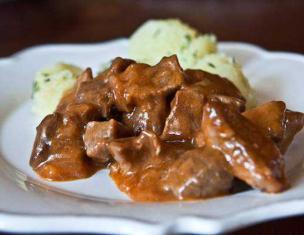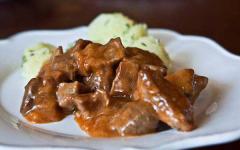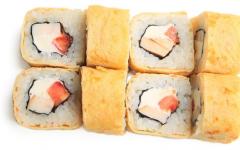Dishes from the countries of the Rising Sun do not lose their popularity. Japanese omelette is an excellent option for breakfast - aromatic, filling and easy to prepare. The most interesting thing is that there are a lot of options for preparing an omelet, so every morning you can pamper your family with a new dish.
It is worth noting that the Japanese cook omelettes in a special square frying pan. But you can use a traditional pancake pan or non-stick frying pan.
Classic Omuraisu takes just 30 minutes to prepare.
Be careful - the dish turns out to be quite spicy, so it is not recommended to give it to children.
- a little bit of any oil for frying;
- 1 small hot pepper;
- 1 tbsp. l. soy sauce;
- 2-4 feathers of green onions;
- ⅕ teaspoon fine salt;
- 1 small onion;
- 2 stacks ready boiled rice;
- 6 eggs;
- 2 fresh shiitake mushrooms (oyster mushrooms, champignons).
Cooking the dish step by step:
- Wash the hot pepper, remove the seeds and chop very finely.
- Wash the mushrooms, dry with a paper towel and cut into thin slices.
- Peel the onion, rinse with cool water and cut into small cubes.
- Heat the oil in a frying pan, add chopped peppers and onions, fry for 2-3 minutes.
- Add mushrooms to the vegetables, cook for another 4-5 minutes, stirring occasionally.
- Reduce heat, add rice and mix thoroughly. Make sure the filling is crumbly. After 5-7 minutes, turn off the heat and leave the filling covered.
- Wash the onion feathers. Cut into small rings.
- Beat the eggs, adding soy sauce. Add onion and mix thoroughly.
- Grease a baking sheet with oil, pour in the omelette mixture and place the dish in the oven. Bake at 200 degrees for 5-6 minutes. Then remove the pan and leave the omelette to cool slightly.
- Place the prepared rice filling evenly on one edge. Roll it into a roll and place it on a plate. Cut into small pieces. It is recommended to serve with light soy sauce.
Japanese omelette with rice and vegetables is a delicious option for lovers of a light and tasty breakfast.
To prepare a Japanese omelette you will need:
- 5 eggs;
- 10 grams of red onion;
- 5 grams of green onions;
- 30 grams each of green and red pepper.
- butter for frying.
- salt and black pepper to taste.
Cooking steps:
- Wash the vegetables, cut into small cubes and mix in one container.
- Beat eggs until smooth with ground pepper and salt.
- Heat butter in a frying pan. When it melts, pour the excess into a separate container. Make the fire slow.
- Pour a third of the omelet into the pan. Place a third of the vegetables on top. After 1-2 minutes, use a spatula to roll the omelette pancake with vegetables into a roll, but do not remove it from the pan, moving it to the edge of the vessel.
- Pour in a little more mixture and spread half of the remaining vegetables on top. After 1-2 minutes, wrap the rolled egg roll in a new omelette and also leave it on the edge of the pan.
- Pour in the rest of the egg mixture and add the last of the vegetables. As in the previous paragraphs, wrap the roll in a new omelette layer.
- Leave in the pan for 3-5 minutes, you can cover with a lid.
- Place the omelette on a bamboo mat and roll it so that the cooled roll takes on a slightly rectangular shape. Leave for 3-5 minutes to harden.
- Cut the omelette into equal pieces. Before serving, you can sprinkle with herbs.
A very tender and aromatic option for preparing the Oyakodon omelet - with rice.
You will need the following list of ingredients:
- 120 grams of boiled rice;
- 30 grams of tomato paste or ketchup;
- 2-4 large champignons;
- 2-3 sprigs of fresh cilantro;
- 3 eggs;
- 2 tablespoons of milk;
- salt and pepper to taste.
Preparation:
- Cut mushrooms and cilantro into small cubes.
- Beat eggs with milk until smooth.
- Fry the mushrooms for 5-7 minutes. Add boiled rice, tomato paste, pepper and salt. Mix well and fry for 10 minutes, stirring occasionally.
- Place the prepared filling in a plate and sprinkle with fresh herbs. Some of the greens can be left for decoration before serving.
- Pour the egg mixture into the pan. Wait until the future omelette hardens a little on the bottom side.
- Place the finished filling on half of the pancake and use a spatula to cover it with the other half.
Cut the roll into 2 parts and place on plates. Top with herbs and serve.
Recipe for Japanese rice omelette “Oyakodon” with rice and chicken
This dish can be not only a hearty breakfast, but also a quick dinner.
Ingredients for Japanese rice omelette recipe:
- 1 small onion;
- half a chicken fillet;
- ½ cup uncooked rice;
- 3 chicken eggs;
- 6 tablespoons of soy sauce;
- 2 tablespoons sugar;
- 20 grams of green onions.
Preparation:
- Peel the onion, cut the head into thin layers;
- Heat the sauce in a frying pan. When it starts to boil, add onion rings and sprinkle with sugar;
- Rinse the chicken, pat dry with a paper towel and cut into small cubes;
- Add chicken to sauce and onions, cook for 5-6 minutes;
- While the meat is stewing, prepare the egg mixture: beat the eggs until smooth. There is no need to add salt, as the sauce will provide the necessary saltiness;
- Boil the rice until it becomes crumbly;
- Pour the beaten eggs evenly over the meat. Cover the dish with a lid. Leave for 5-7 minutes.
- Place the rice on a serving dish and smooth it out a little with a spoon. Place the omelette with meat on top, sprinkle with chopped onions.
On a note. In Japan, rice is placed in a deep bowl, and the cereal is covered with an omelette without breaking the circle. For convenience, you can cut the omelette into triangles and place it on top of the rice.
Japanese omelette for Tamago-yaki rolls


Japanese rolls are usually wrapped not only in nori; Tamago omelette is also used for this. Japanese omelette for rolls turns out to be very delicate in taste, and for the filling you can choose not only the components of traditional rolls.
This is interesting: an omelette in a bag
To prepare you will need:
- 4 eggs;
- 1 tbsp. l. soy sauce;
- 1 tbsp. l. sour cream or 2 l. milk.
The preparation is very simple: all the ingredients need to be thoroughly beaten and the pancakes fried in a heated, oiled frying pan.
Frying has its own nuances:
- Using a ladle, pour a small portion of the egg mixture into the pan;
- when the bottom side of the future pancake is fried, roll the omelette into a roll with a spatula or chopsticks and push it to one edge of the pan;
- pour in the next portion of the egg mixture so that it gets a little under the roll;
- after 2-3 minutes, when the new pancake is slightly fried, you can add any filling and roll, starting with the finished roll;
- Continue cooking in the same way until the egg mass and filling are finished.
If small sizes are preferred, you can get by with 2-3 pancakes per roll, and prepare a new one from the remaining mixture. It’s worth remembering that an omelette pancake wraps well when hot.
In our article we want to talk about how Japanese rice omelet is prepared. In general, in Japan this dish is prepared in two variations. Traditional national food is called omuraisu. An omelet prepared in a Western style is called "omuretsu". consists of fried rice doused with egg. Meat is often added to it, usually chicken. Omurice is served with ketchup. The dish even has its own story. It is believed that it was first served in 1902 in a restaurant in Tokyo. When preparing the dish, the owner of the establishment borrowed the idea from an old recipe for chakin-zushi (essentially sushi rice wrapped in an omelette sheet).
Rice omelet: recipe
Let's figure out how omurice is prepared.
Ingredients:
- One or two glasses of boiled rice.
- One chicken breast.
- Three eggs.
- One onion.
- (you can take fresh or dried, if you don’t have them, you can replace them with other mushrooms) - ½ cup.
- One chili pepper.
- Butter - 25 g.
- Ketchup.
- Two cherry tomatoes as garnish.
- Salt.
- Greenery
Cooking rice omelet
Rice omelet is quite simple to make, so you will quickly master its preparation. Let's start by melting the butter in a frying pan and then frying the chili peppers and onions until soft.
We wash the chicken fillet well and cut it into pieces, then throw it in to fry with the vegetables. A wok is good for such purposes. Fry the chicken until white, also add chopped mushrooms. After a few minutes you can add it. Then mix all the ingredients and season with ketchup. The products should simmer for several minutes on the fire, after which the pan should be removed from the heat. If desired, you can add garlic, unless, of course, this is a dish prepared for breakfast.

Next, take a clean frying pan, melt the butter in it and cook the most ordinary egg omelet in it. An interesting fact is that the Japanese do not beat eggs with a mixer or fork, as we do. They stir them very carefully with chopsticks, even at the moment when the mixture is already in the frying pan. As soon as the omelette is ready, put the mixture we prepared earlier in the very middle and roll it all together in the form of an envelope or roll. If you can’t manage to do this, then you can simply cover the mound of rice on a plate with an omelette and decorate the dish with herbs, vegetables and ketchup. Our rice omelette is ready. As you can see, there is nothing complicated in its preparation, but the dish turns out to be more satisfying due to the presence of meat, rice and vegetables. It is for this reason that rice omelet can be served as an independent dish at any time.
Oyakodon - chicken and rice omelette: ingredients
How to make Japanese rice omelette? We would like to offer you another cooking method.
Ingredients:
- One onion.
- Chicken fillet - 350 g.
- Half a glass of rice.
- Two tablespoons of sugar.
- Soy sauce - 6 tbsp. l.
How to prepare oyakodon?
To prepare a rice omelette, heat a frying pan and pour in six to seven tablespoons of sauce (soy) and fry the onion, cut into thin rings, on it. You need to put it in the bowl only when the sauce starts to boil. Sprinkle sugar on top of the onion and cook for a couple of minutes, stirring.
Next, cut the chicken fillet into small pieces, but not too small. When cooked, the meat should retain its juiciness. The chicken should be placed in a frying pan and mixed with the sauce. As soon as the meat turns white, you can turn it over to the other side; it needs to simmer for a couple more minutes.

In a separate bowl, you need to beat the eggs until smooth, but you should not add salt, since the soy sauce in which we cooked the meat is already quite salty. Pour the egg mixture into the pan with the chicken so that the entire surface is covered with it. Next, cover the dish with a lid. Cook the rice omelette for no more than four minutes, without stirring the ingredients.
Chop the green onions. Place boiled rice in a heap on a plate, put an omelette on top and sprinkle it with onion greens. The dish is served hot.
Another option for preparing a Japanese omelette
Filling ingredients:
- Sausage - 200 g.
- Boiled rice - 3 tbsp. l.
- Greenery.
- Spices.
- Ketchup.
Ingredients for the omelette:
- Two tablespoons of milk.
- Several eggs.
First, let's prepare the filling. Cut the sausage into pieces. Chop the greens. Next, lightly fry the sausage in a heated frying pan in sunflower oil, add rice and stir. Then pour in ketchup, add spices and herbs. Simmer all the ingredients for a couple of minutes and remove the pan from the heat.

In a separate bowl, beat the eggs and add milk. Pour the egg mixture into a heated frying pan and prepare an omelette. When the lower part sticks a little, and the upper part is still raw, you need to put the filling on one half. Using a spatula, cover the rice and sausage with the second part. The omelet should simmer for a couple more minutes. Then you can transfer it to a plate and serve, garnished with herbs and ketchup.
Features of Japanese omelet
Japanese omelette is a traditional oriental dish. There is no particular difficulty in preparing it. The simplest products are used. Residents of Japan cook omelettes in a special rectangular frying pan. And they turn the egg pancakes over with traditional chopsticks. We can use an ordinary or pancake frying pan and a spatula. The Japanese serve pickled ginger or wasabi with their omelette. They can be replaced with ketchup with herbs or sour cream sauce with garlic. In general, there are a lot of options for preparing the dish. You can experiment with the ingredients yourself, choosing them to suit your taste.

In addition, there are many little cooking tricks. So, for example, rice should be steamed, then it will turn out crumbly, but cooked in water it will always stick together. If you use soy sauce, then no salt is needed, otherwise the dish may turn out to be too salty. Knowing these nuances will allow you to prepare a delicious omelet.
I love oriental cuisine and Japanese in particular =) Today we will cook Omurice.
A little about the dish itself:
Omurice is a very common dish in Japan. It is considered a Western dish modified to suit Japanese tastes because it includes scrambled eggs and rice flavored with tomato ketchup. As you may have guessed, the word omurice comes from the words “omelet and rice.”
Omelette, pilaf and other dishes of overseas cuisine came to Japan from abroad at the end of the 19th century. The Japanese strictly followed some Western recipes and adapted others to their tastes. Soon these variations began to spread throughout Japan. Most experts agree that omurice was first served in 1902, at the western restaurant Renga-tei in Tokyo's Ginza district. They say that the owner was inspired to think about such a dish by an old recipe for chakin-zushi (sushi rice wrapped in a thin layer of fried egg).
Omuraisu is still popular. It is served everywhere from Western-style restaurants and mom-and-pop eateries to coffee shops. It is also often eaten at home, because everything you need for it is almost always available in the kitchen, and it is not difficult to prepare.
So let's start, to prepare 2 servings of this dish we will need:
ginger - 1 cm.
1/4 large onion
4 champignon caps (or Shiitake)
1 tbsp dry white wine
200 grams of peeled tomatoes
1 tbsp ketchup
1/2 teaspoon freeze-dried broth (or half a cube)
1 bay leaf
1 chicken breast (about 150 grams)
300 grams cooked rice
2 packs of coffee creamer
vegetable oil

Cut the chicken into pieces approximately 1.5 x 1.5 cm.

add a little salt and leave it alone for a while

cut the onion into small cubes

next we take ginger

and cut into even smaller cubes;)

heat the oil in your favorite frying pan

if you took fresh ginger, then first fry it for a minute and then add the onion, but since I only had pickled ginger left, I fried them immediately together

fry until the onion is as soft as we need it

While the onions are frying, clean the champignons

and cut them

When the onion has reached its proper condition, add chicken to it

fry until the chicken turns white and add the mushrooms

and after 30 seconds pour the wine into the liquid and stir vigorously


wait until most of the wine has evaporated and add the tomatoes



and bay leaf

stirring and simmering the whole thing for a couple of minutes

season with salt


and put the rice in the pan

mix thoroughly (it is advisable to mix the rice as if cutting it with the edge of a spatula and turning it over, then its texture will be better preserved)

Divide the resulting mass into 2 parts and cover with a lid and set aside.

Break 2 eggs into any container

add cream from one package

add salt, pepper, and beat just a little bit - just until everything is mixed

take a clean frying pan

and while it is heating up, grease it thoroughly with oil
directly onto our dish in a frying pan and only then turn it all over;))
in the end it should look something like this:

To prepare the second portion, repeat the steps and serve with salad or vegetables.
P.S. If desired, you can add a couple more spoons of fresh peas to this dish
Oriental cuisine and proper nutrition are quite compatible, so many recipes can be included in your diet. And sometimes you can even indulge in sushi and rolls, carefully reading the ingredients, of course. But this time I want to talk about how to cook a Japanese omelette - another wonderful dish of oriental cooks.
Secrets of cooking Japanese omelettes
To be more precise, under the name “ Japanese omelette” means not one thing, but 3 whole dishes called tamago-yaki, omuraisu and oyakodon. Each one differs in both cooking technology and taste. But they all really come from Japan, that is, they are tasty, simple and prepared on the basis of one of the best products in the world - eggs.
Oriental dishes are recognizable due to the combination of several tastes - salty, spicy and sweet. It's delicious, but don't forget that the sweetness comes from sugar. And at home, it can be replaced with at least honey, but store-bought dishes are unlikely to be adapted in this way.
Each of the recipes described fits into the rules of the PP and is quite suitable for or lunch. The first option is a Japanese tamago omelette with cheese - you can even have it for dinner.
Japanese tamagoyaki omelette with cheese
I'll start with a slightly modified tamago-yaki.
The name of the dish is translated quite predictably - “fried eggs”.
Serve it as an independent treat, adding radishes as a side dish, or use it to make sushi and rolls.
Traditional Japanese omelette rolls consist of beaten eggs with soy sauce, rice wine and sugar. It's delicious, but the recipe for tamago-yaki with cheese and herbs is much tastier. And this Japanese omelette is easy to prepare; the recipe with photos of the cooking stages is an excellent confirmation of this. 190 16 13 1.1
Nutritional value per 100 g:
- Calories: 190
- Proteins: 16
- Fats 1,1
- Carbohydrates: 13
What you need:
- eggs - a couple of pieces
- greens – 5-10 g
- hard cheese – 40 g
- oil for lubrication (optional).
- a pinch of salt and pepper (black and red).

How to do:
Chop the greens and grate the cheese on a fine grater.

Beat eggs, salt and pepper. You can strain through a sieve.

Heat a frying pan and lightly grease it with oil. Pour in 1/3 of the mixture and bake over low heat.

When the egg is slightly set, add grated cheese.

Using a spatula, carefully roll up the roll. Leave it on the edge of the pan.

Pour another 1/3 of the mixture, sprinkle with herbs. Bake and roll the roll, turning it in the opposite direction. .

Pour in the last third of the mixture and add cheese. Roll the roll. Sprinkle cheese on top.

Cover the pan with a lid and steam for 3 minutes over very low heat. Increase the size of the roll and it will become fluffy. Serve immediately.

Classic tamago-yaki consists of more than 3 pancakes, but the technology is the same. Then, using a mat wrapped in cellophane, the roll can be given a shape reminiscent of sushi.
This video shows how to properly make a classic tamago-yaki omelette in a regular kitchen (I liked the recipe because there is no sugar):
Japanese omelette with omuraisu rice
 This hearty omelette is a complete meal. Translated, “omuraisu” means rice in an omelet.
This hearty omelette is a complete meal. Translated, “omuraisu” means rice in an omelet.
That’s right, omuraisu is a Japanese omelette filled with rice and various additives, in our case vegetables and mushrooms.
They say that in Japan they use white rice, but I doubt it (by the way, maybe who knows exactly what kind of rice the Japanese eat - you are welcome to answer, it’s actually very interesting). In any case, we will take the more useful brown one.
Prepared from these products is enough for 2 people
Nutritional value per 100 g:
- Calories: 123
- Proteins: 5
- Fats 8
- Carbohydrates: 10
Ingredients:
- eggs - 3 pcs.
- boiled brown rice - 1 tbsp.
- fresh or dried mushrooms (mushrooms) - ½ tbsp.
- onions - 1 pc.
- tomatoes - 1 pc.
- chili pepper - half
- vegetable oil - 20 g
- spices, herbs - to taste
- soy sauce - 2-3 tbsp
- cherry tomatoes for decoration - 2 pcs.
Cooking steps:
- Onions, mushrooms (dry ones are first soaked in boiling water for 3-4 hours) - wash, cut into small cubes and simmer with vegetable oil over medium heat for 3-4 minutes.
- Add pureed tomatoes, salt, spices, chopped chili and simmer for another 3 minutes.
- Lay out the rice, add soy sauce, taste it, adjust with seasonings and soy sauce and move on to the omelet.
- Beat eggs with soy sauce and herbs.
- Pour into a hot frying pan. As soon as the top sticks a little, put the filling on half of the omelette, level it, carefully cover, pressing, with the other half and bring the Japanese-style rice omelette to readiness - this is 5-7 minutes - under the lid over low heat. This is exactly how it is prepared, if you remember.
- Turn off the gas and do not open the lid for another 5 minutes.
- Now the Japanese omelette omurice can be served.
Oyakodon - Japanese omelette with rice and chicken
 In addition to eggs and rice, this dish also includes chicken, as well as specially prepared onions.
In addition to eggs and rice, this dish also includes chicken, as well as specially prepared onions.
The rice itself is cooked in advance, and the omelette with meat and onions is prepared immediately before serving - everything is very simple and quick.
The secret of originality is in how it is all put together and presented.
A The original name of the dish is “fathers and sons” - due to the fact that the main components are eggs and chicken(the logic is clear, I think?)
This amount of ingredients is enough for 2-3 servings.
Nutritional value per 100 g:
- Calories: 121
- Proteins: 12
- Fats 5
- Carbohydrates: 7
What you will need:
- chicken fillet - 500-600 g
- chicken eggs - 3 pcs.
- 1.5 cups brown rice (cooked)
- white onion - 1 pc.
- honey - 1 tsp.
- soy sauce - 2 tbsp. l.
- green onions - a bunch
How to prepare oyakodon:
- Our rice is already cooked (all the secrets of cooking brown rice), so we prepare the omelette itself.
- Chop the onion into half rings.
- Pour the soy sauce into a dry frying pan, wait for it to boil and immediately add the onions.
- Stir, cook for 1 minute and add honey.
- Simmer until the liquid has evaporated and the onions begin to caramelize.
- Now add the shredded chicken breast. Cook everything together, stirring occasionally, over medium heat for 7-8 minutes.
- Beat eggs with chopped herbs and pour over meat.
- Cover with a lid and cook for 4 minutes over low heat. Turn it off.
- Place heated rice in a deep plate (the top of which should be the same size as the diameter of the frying pan), and our omelette will lie on top in one “pancake” - this is how oyakodon is served in Japan.
Rice in recipes can be replaced with another cereal - whole grain oatmeal. And overall it turns out delicious!
If you need to increase the amount of protein in your diet, omelettes are ideal, but then don’t take all the yolks, one is enough. But you can take more proteins by adding 2-3 eggs.
N Last week, handicraft Jussie was working on , and now she’s determined to conquer the famous omurice!
We give the floor to the chef:
Omurice or omuraisu (omu-raisu) is a Japanese dish consisting of fried rice wrapped in or topped with an omelette. It is served with ketchup, which is often used to write some phrase/message or the name of the person for whom it is prepared.
As you may have guessed, the name omurice is a combination of the words omelette and rice - the main ingredients of the dish.
Omurice is a perfect example of yohshoku, a food with Western roots that the Japanese have adapted to suit their own tastes. This dish, by the way, is very popular in Japan and is also the main feature of many maid cafes.

The client can order a specific drawing for himself or ask the maid to draw something of his own. In short - any ketchup-calligraphic whim for your hard-earned money (within the limits of a standard plate, of course).
Now let's dive into history:
Omelette, pilaf and other dishes of overseas cuisine came to Japan only at the end of the 19th century. The Japanese strictly followed some Western recipes and adapted others to suit their tastes. Soon these variations began to spread throughout Japan. Most experts agree that omurice was first served in 1902, at the western restaurant Renga-tei in Tokyo's Ginza district. They say that the owner was inspired to create this dish by an old recipe for chakin-zushi (sushi rice wrapped in a thin layer of fried egg).

Here's what we need for cooking:
130 gr. chicken fillet
1 clove of garlic
¼ onion
50 grams of fresh champignons (or other mushrooms, the main thing is not fly agarics or toadstools)
1 tbsp. l. guilt
200 gr. canned tomatoes
1 tbsp. l. ketchup
½ bouillon cube (2.8 g)
1 bay leaf
30 gr. frozen green peas
Olive oil, salt, pepper
280 gr. rice cooked in less than usual amount of water
4 eggs
2 tsp. cream
Greens for decoration, ketchup for drawing
First, cut the fillet, pepper and salt (well, just don’t overdo it). Then chop the onion, garlic, mushrooms, and bouillon cube. Pour boiling water through frozen green peas and add salt. Now we’ll make the base for the omelette: break and beat two eggs, add cream, salt, pepper and mix.
Then pour the garlic into the pan and fry over low heat until it gives off an aroma. Add the onion and wait for it to become translucent before adding the meat. Separate pieces of meat to prevent them from sticking together. When the fillet turns light, add the champignons. Then pour in the wine and fry until the alcohol evaporates. Now it’s the turn of canned tomatoes, ketchup, bouillon cube and bay leaf - add and mix.
Add the green peas and stir-fry until the mixture becomes thicker in consistency. Remove the bay leaf and taste it. If necessary, add salt and pepper. Add pre-cooked rice and stir, breaking up any lumps. Since the amount of ingredients is designed for two people: divide the resulting portion into two servings and transfer to plates (especially insatiable people can pour everything into one).
All that's left to do is prepare the omelette! Pour the prepared mixture into the frying pan, stir quickly and gently to obtain a homogeneous consistency and wait until it is cooked. Then there are two ways: the first is to lay out the rice, wrap it in an omelette and turn it over into a plate, as shown in the video, the second is intended for people with a shaky psyche and trembling hands who are afraid of ruining the integrity of the omelette. In short, just remove the omelette from the pan and cover the rice already in the plate. Decorate the resulting dish with herbs, arm yourself with ketchup and write/draw whatever your fevered mind comes up with.


The recipe described is one of many variations of this easy-to-prepare dish. For example: you can also add seafood to rice, combine it with other vegetables, etc. There are restaurants in Tokyo that specialize exclusively in omurice and offer a huge variety of toppings and toppings such as curry or hayashi (beef with sauce). Omurice is also offered in school canteens, department store cafes and family restaurants as part of the children's menu.
Recently, many dishes similar to omurice have appeared, but with different fillings. For example, Omusoba, where fried noodles - yakisoba - are used instead of rice. And if taco rice is used as a filler, then the dish is called omutako.

Omurice appears frequently in manga and anime. For example, in a recent episode, the entire 20th episode was dedicated to omurice.

P.S. the same restaurants specializing in omurice:










